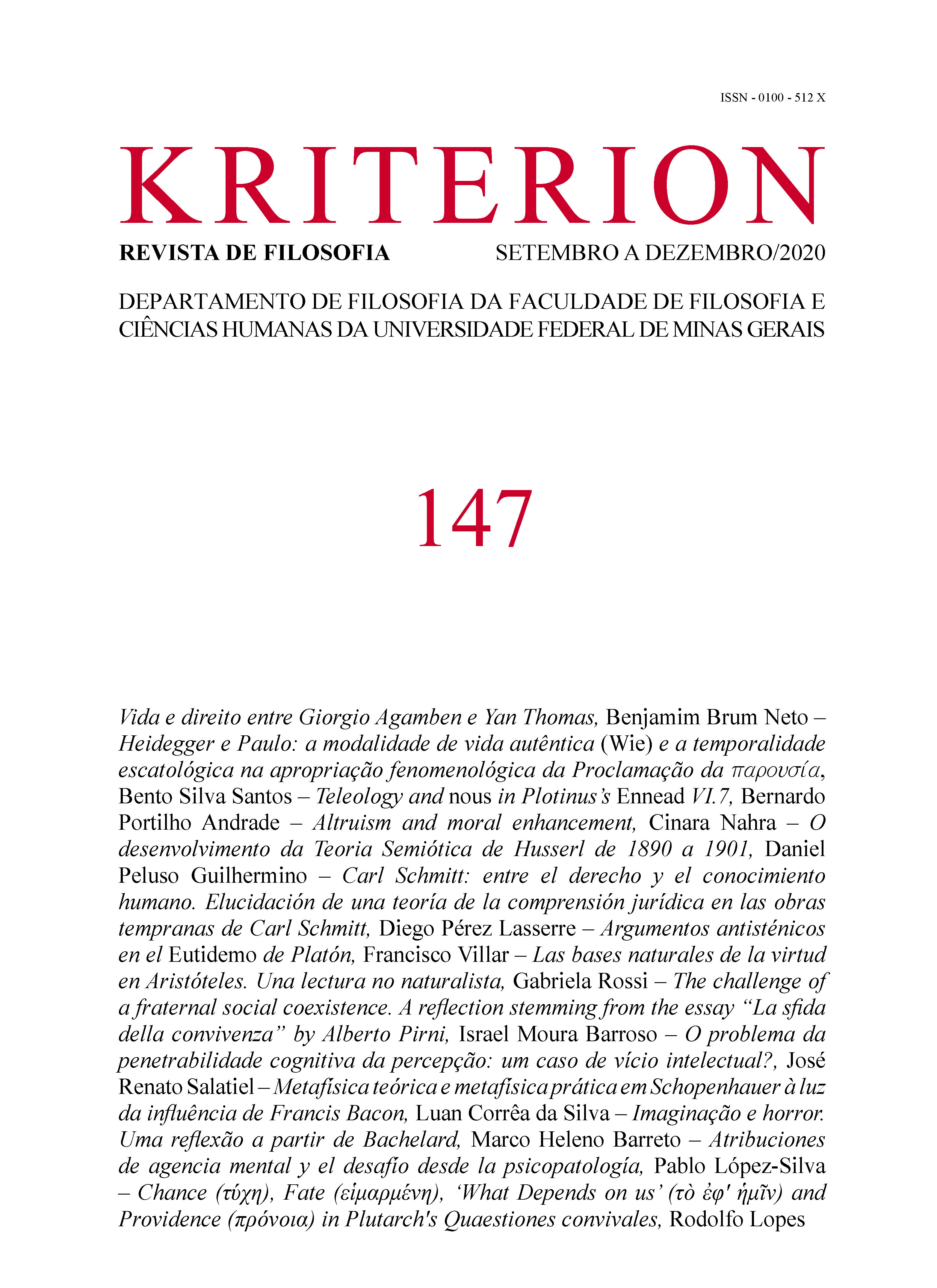TELEOLOGY AND NOUS IN PLOTINUS’S ENNEAD VI.7
Palabras clave:
Plotinus, Teleology, Intellect, Philosophy of NatureResumen
In this paper, I argue that Plotinus’s critique of divine deliberation in Ennead VI.7 does not seek to banish teleology altogether from his philosophy of nature. Rather, his critique aims to situate teleology within his own metaphysical system so as to reconcile it with the basic principles governing the intelligible universe. In this sense, Plotinus does not propose that we expunge all reference to notions of utility and benefit from our natural explanations; he merely wishes to render those notions coherent with an ontology in which the intelligible always takes precedence over sensible reality. To this end, Plotinus introduces, first, what I call a vertical teleology, where the different animal species create the necessary conditions for the maintenance of higher forms of intelligible life, such as genera. Second, Plotinus advances what I call a horizontal teleology, where the various animal organs serve to provide a minimal coefficient of noetic content to each species in its respective ontic level. Plotinus thus sketches the outlines of a properly ‘noetic’ teleology in Ennead VI.7.
Descargas
Citas
BRISSON, L. “Can One Speak of Teleology in Plato?”. In: L. Pitteloud, E. Keeling (eds.). Psychology and Ontology in Plato. Philosophical Studies Series, Vol. 139. Cham: Springer, 2019. pp. 109-124.
CHIARADONNA, R. “Intelligibles as Causes in Plotinus’ Metaphysics: Enn. VI.7”. In: C. Natali, C. Viano (eds.). Aitia II: Avec ou sans Aristote: Le débat sur les causes à l’âge hellénistique et imperial. Louvain-la-Neuve: Peeters, 2014a. pp. 207-236.
______. “Plotinus’ Metaphorical Reading of the Timaeus: Soul, Mathematics, Providence”. In: P. D'Hoine, G. Van Riel (eds.). Fate, Providence and Moral Responsibility in Ancient, Medieval and Early Modern Thought: Studies in Honour of Carlos Steel. Leuven: Leuven University Press, 2014b. pp. 187-210.
COOPER, J. “Hypothetical Necessity and Natural Teleology”. In: A. Gotthelf, J. Lennox (eds.). Philosophical Issues in Aristotle’s Biology. Cambridge: Cambridge University Press, 1987. pp. 243-274.
CORRIGAN, K. “Humans, other animals, plants and the question of the good: The Platonic and Neoplatonic traditions”. In: P. Remes, S. Slaveva-Griffin (eds.). The Routledge Handbook of Neoplatonism. New York: Routledge, 2014. pp. 372-392.
______. “Love, Friendship, Beauty, and the Good: Plato, Aristotle, and the Later Tradition”. Eugene: Cascade Books, 2018.
DESCARTES, R. “Meditations on First Philosophy: With Selections from the Objections and Replies”. Transl. John Cottingham. Cambridge: Cambridge University Press, 2017.
DILLON, J., GERSON, L. “Neoplatonic Philosophy: Introductory Readings”. Indianapolis: Hackett Publishing Company, 2004.
EMILSSON, E.K. “Plotinus on Intellect”. Oxford: Oxford University Press, 2007.
HADOT, P. “Structure et Thèmes du Traite 38 de Plotin”. In: W. Haase (ed.). Aufstieg und Niedergang der Romischen Welt II.36.1. Berlin: De Gruyter, 1987. pp. 625-676.
HAM, B. “Plotin: Traité 49: V.3”. Paris: Les Editions du Cerf, 2000.
NOBLE, C., POWERS, N. “Creation and Divine Providence in Plotinus”. In: A. Marmodoro, B. Prince (eds.). Causation and Creation in Late Antiquity. Cambridge: Cambridge University Press, 2015. pp. 51-70.
PITTELOUD, L. “Why Is the World Soul Composed of Being, Sameness and Difference?” In: L. Pitteloud, E. Keeling (eds.). Psychology and Ontology in Plato. Philosophical Studies Series, Vol. 139. Cham: Springer, 2019. pp. 85-108.
PLATO. “Timaeus”. Transl. Donald J. Zeyl. In: J.M. Cooper (ed.). Plato: Complete Works. Indianapolis: Hackett Publishing Company, 1997. pp. 1224-1291.
PLOTINUS. “Enneads”. Greek Text with English Translation, 7 Vols. Transl. A.H. Armstrong. Cambridge, MA: Loeb Classical Library, 1966-1988.
RAPPE, S. “Explanation and Nature in Enneads VI.7.1-15”. In: M. Wagner (ed.). Neoplatonism and Nature: Studies in Plotinus’ Enneads. Albany, NY: State University of New York Press, 2002. pp. 71-98.
SCHIAPARELLI, A. “Essence and Cause in Plotinus’ Ennead VI.7 [38] 2: An Outline of Some Problems”. In: D. Charles (ed.). Definition in Greek Philosophy. Oxford: Oxford University Press, 2010. pp. 467-492.
SCHROEDER, F. “Form and Transformation: A Study in the Philosophy of Plotinus”. Montreal and Kingston: McGill-Queen’s University Press, 1992.
SILESIUS, A. “Sämtliche Poetische Werke”. Ed. H.L. Held. Munich: Hansen, 1949.
THALER, N. “Traces of Good in Plotinus’s Philosophy of Nature: Ennead VI.7.1–14”. Journal of the History of Philosophy, Vol. 49, Nr. 2, pp. 161-180, 2011.










